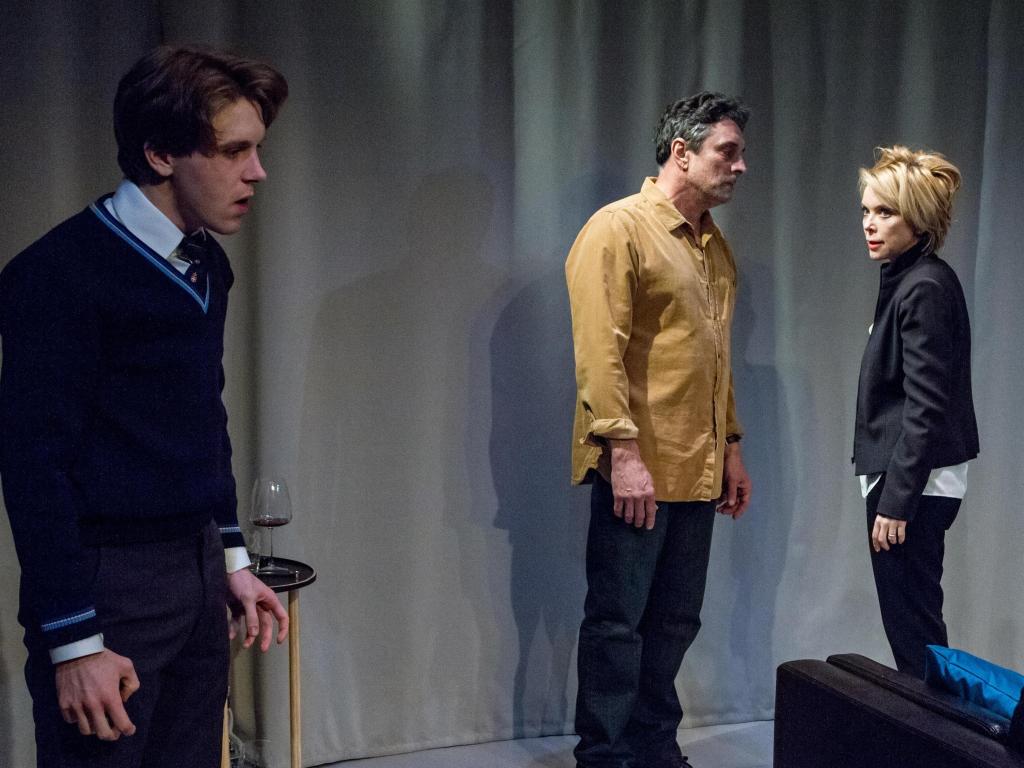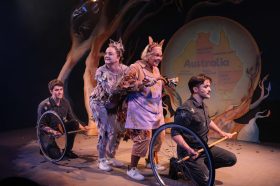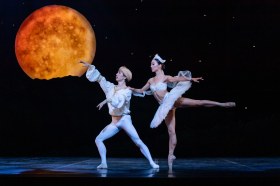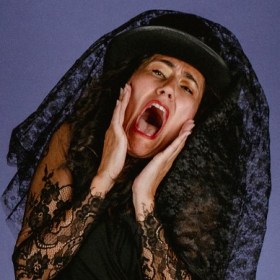Sean Rees-Wemyss, Joe Petruzzi and Danielle Carter in Fury. Photography by Teresa Noble.
Murray-Smith herself is delighted by the Red Stitch Company’s production, declaring last week on Radio National, ‘As always Red Stitch has managed to produce something twice as good as anybody else on no budget’.
The play centres around the experience of a heterosexual married couple grappling with the actions of their only son, Joe (Sean Rees-Wemyss). Alice (Danielle Carter) a celebrated neuro-scientist is married to Patrick (Joe Petruzzi) a novelist and mediator.
From the opening scene, as the couple discuss dinner party arrangements on their leather sofa, Alice declares herself by her own admission a woman who possesses a strong temper. She speaks of her anger as an energy which has aided her resilience and success in the male dominated context of her profession.
Within a few minutes of the play, Joe’s school teacher, Warren (Dushan Phillips), has broken the news to the Alice and Patrick that their sixteen-year old son is in police custody due to video footage proving him to have graffitied and vandalised the local mosque, in the company of his school friend Ethan Evans.
When confronted by his parents, Joe reveals himself to be without remorse for what he has done, solidified in his racist, anti-muslim position, in the name of protecting his mother and his community, and with every intention to continue his singular war with an possible arson attempt.
What follows is what Murray-Smith describes as ‘the ripple effect of one child’s act’. A tense meeting follows between the parents of Ethan, Bob and Annie (played by Chris Connelly and Shayne Francis) and Alice and Patrick. Naturalism is sacrificed to fast moving, direct and somewhat comic dialogue. The characters’ positions are stated fast and border on the stereo-typical but Murray-Smith’s writing has the blessing of wit and edgy aggression which allows her to cover issues of the Australian class system and white bigotry.
Slicing through the 85-minutes of uninterrupted action at a breathless rate, the audience is privy to close-up witnessing of heady interactions usually between two of the characters, and invariably in states of high emotion. Murray-Smith’s history as a libretto writer is palpable in this operatic style of facing-off two characters who rapidly reveal all and then swoop away.
It is an excellently directed piece by directors Ella Caldwell and Brett Cousins. The fine design solution to a play of many scenes is Chloe Greaves’s use of a transluscent lilac grey curtain which runs on a huge circular railing on the ceiling of the stage (it resembles the mechanism of a hospital bed curtain) which wipes the slate clean as it swishes rapidly around scene after scene, to reveal magically a new simple stage tableaus. The effect is effortless, dreamy and is augmented by the sonorous emotional poetry of the music that sound designers ‘The Sweats’ have contributed.
The stage design is stark and creates a tremendous sense of space which is surprising in such a small auditorium. The sparseness of the design mirrors the distilled and concentrated nature of the dialogue. When the anger is at its highest level the pathos is maximised because for me there was nowhere else to look but the contorted, spitting, angry faces of Alice and Patrick screaming at each other with blame and confusion, or the cool lethargic body language of the sociopathically cruel school teacher, Warren.
At one point the narrative tension erupts into a swipe of physical violence, choreographed by Melbourne’s talented fight designer Felicity Steel, as Alice punches her son. Her brutal act inaugurates the cracks in their nuclear family set-up widening and widening. Over the next 90-minutes intense processes of transformation within the triangular dynamic will unfold and life will will not be the same again for Alice, Patrick and Joe. Alice’s dreadful question ‘When will we stop being so blessed?’ appears to her now as a predilection for Joe’s turn towards hating innocent community members.
In addition to a brief exploration of racism against Islamic people in Australia, Murray Smith seamlessly weaves other topics of contemporary social concern through the play’s narrative. These include: open access to wrong information via Facebook by young people, the consequences of private education which alienates societal groups from one another (Joe has never ‘met a muslim in his life’ we are told), the tensions that arise from a woman’s professional success, as regards being a mother and wife, the splitting pressures on contemporary fathers to ‘be a man, don’t be a man’.
One of the play’s most poignant themes for me is the sheer enigma that most children present to their parents. Who knows really who a child will turn out to be?
Though this anxiety about parental alienation, or lack of ‘parental control’ (a well-known phase in common parlance) is heightened by the advent of remote digital worlds that a child can entirely shut out a parent from, it is also a timeless phenomenon that spans history. What creates a certain type of person, good or bad, is beyond any parenting manual’s edicts.
It would appear that there are some things that even the most educated can neither control nor even understand. At the end of the day, Joanna Murray-Smith appears to be endorsing emotional intelligence and kindness, so lacking in Joe’s school context, as playing a vital role in the attainment of harmonious human interactions.
That she is a playwright who cares about positive social outcomes sings out in her writing in the way that she affords her audience sympathy with all her characters; her empathetic writing makes her sometimes didactic speech-making easier to handle because her characters are humorously well-observed and living breathing replicas of the Australians spouting opinions around this country today.
Rating: 4 stars ★★★★
Fury
By Joanna Murray-Smith
Directed by Brett Cousins & Ella Caldwell
Featuring: Joe Petruzzi, Danielle Carter, Chris Connelly, Shayne Francis, Dushan Philips, and Sean Rees-Wemyss
Set & Costume Design by Chloe Greaves
Lighting Design by Kris Chainey
Sound Design by THE SWEATS
Assistant Director Casey Filips
Stage Manager Hannah Bullen
29 May – 1 July 2018
Red Stitch Actors’ Theatre





